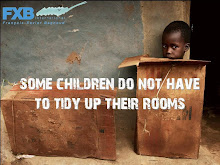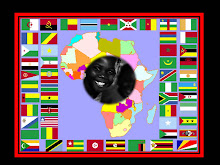Wednesday, March 3, 2010
My African Child
Posted by The Power of One at 6:18 PM 0 comments
Labels: Africa, AIDS, Budgeting for Poverty, famine, Land of Sadness
Friday, February 19, 2010
Deserts Eat the Land, The People Eat Little
One of the major causes of famine, starvation, malnourishment, and world hunger is desertification and its destructive effects. Desertification is defined as the growth or expansion of a desert due to human activity. One of the most drastic examples of this can be found in Africa's Sahel region. The Sahel is a dry grassland region that acts as a transition zone in Africa, transition from Arab to traditional Africa, transition from arid Africa to tropical Africa. It is also home to some of the most malnourished people on this planet.
What causes desertification?
- a region with naturally dry conditions, often times hard-hit by extended drought conditions, such as the drought conditions that have been plaguing the Sahel since the 1960's. There have been regions within the Sahel that have been without rain for five years.
- removal of vegetation through poor agricultural practices and over-grazing of animal herds. The "unprotected, dry soil surfaces then blow away with the wind or are washed away by flash floods, leaving infertile lower soil layers that bake in the sun and become an unproductive hardpan. Overgrazing destroys valuable plant species, leaving mostly unpalatable ones. Losses of vegetation and biodiversity threaten habitat for other species." (http://www.oasisglobal.net/what_cause.htm)
- over-irrigation or incorrect irrigation practices (Go here to see what can happen.)
- war and conflict, which can disrupt local agricultural practices. Frequently war refugees will move into "marginal ecosystems", bringing with them native farming practices not necessarily suited for the region.
- "Perhaps the greatest cause of soil degradation and desertification is an explosion in world population, particularly in developing countries. Throughout the 1990s, dryland regions experienced a population growth of 18.5 percent, mostly in desperately poor, developing nations [source: GreenFacts.org]. In their daily struggle to survive, these expanding populations have put a deadly strain on their environment." (http://science.howstuffworks.com/desertification1.htm)
So what's the result of desertification?
- destruction and loss of vegetation, as well as land degradation and loss of crucial arable land.
- loss of food sources, famine, malnourishment, starvation and death.
- "flooding, poor water quality, dust storms, and pollution. All of these effects can hurt people living near an affected region. (The Facts of Desertification and United Nations Convention to Combat Desertification, 2000)" http://desertificationb.tripod.com/id3.html
- ULTIMATE COST: human dignity at the cost of poverty and world hunger.
Posted by The Power of One at 5:30 PM 0 comments
Labels: Africa, desertification, famine, loss of dignity, Sahel
Thursday, February 4, 2010
Green Hunger
Posted by The Power of One at 5:18 PM 0 comments
Labels: Ethiopia, famine, green hunger
Wednesday, February 3, 2010
Hunger is the Hopeless Child of Poverty & Famine
Bread for the World, a Christian organization dedicated to ending world hunger through education and political action, has gathered some staggering statistics on world hunger and famine.
1. extreme and general scarcity of food, as in a country or a large geographical area.
2. any extreme and general scarcity.
3. extreme hunger; starvation.
923 million people across the world are hungry.
In essence, hunger is the most extreme form of poverty, where individuals or families cannot afford to meet their most basic need for food
Hunger manifests itself in many ways other than starvation and famine. Most poor people who battle hunger deal with chronic undernourishment and vitamin or mineral deficiencies, which result in stunted growth, weakness and heightened susceptibility to illness.
Countries in which a large portion of the population battles hunger daily are usually poor and often lack the social safety nets we enjoy, such as soup kitchens, food stamps, and job training programs. When a family that lives in a poor country cannot grow enough food or earn enough money to buy food, there is nowhere to turn for help.
In the developing world, more than 1.4 billion people currently live below the international poverty line, earning less than $1.25 per day.
Among this group of poor people, many have problems obtaining adequate, nutritious food for themselves and their families. As a result, 820 million people in the developing world are undernourished. They consume less than the minimum amount of calories essential for sound health and growth.
Undernourishment negatively affects people's health, productivity, sense of hope and overall well-being. A lack of food can stunt growth, slow thinking, sap energy, hinder fetal development and contribute to mental retardation.
Economically, the constant securing of food consumes valuable time and energy of poor people, allowing less time for work and earning income.
Socially, the lack of food erodes relationships and feeds shame so that those most in need of support are often least able to call on it.
Famine is a destructive force that erodes not only the fabric of a society, but also destroys the human spirit. Without food, life is a daily struggle, often time becoming a life without hope. Throughout this month, the Power of Only One will address the issues of poverty, world hunger, and famine. I hope to arm you with enough knowledge and to connect you with many excellent organizations so that you become empowered to share your power of only one.
Posted by The Power of One at 5:26 PM 1 comments
Labels: famine, fighting poverty, hunger










.jpg)




